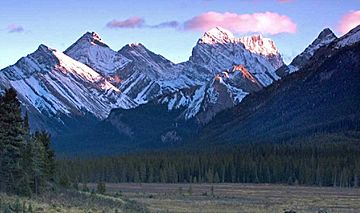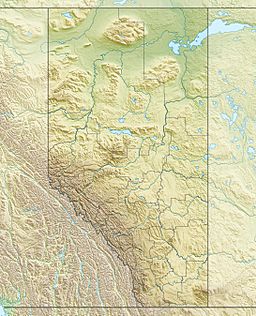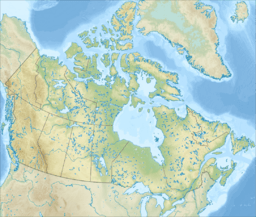Mount Murray (Alberta) facts for kids
Quick facts for kids Mount Murray |
|
|---|---|

Mount Murray to left of center. (Mount French right of center under cloud)
|
|
| Highest point | |
| Elevation | 3,026 m (9,928 ft) |
| Prominence | 313 m (1,027 ft) |
| Parent peak | Mount French (3244 m) |
| Listing | Mountains of Alberta |
| Geography | |
| Location | Alberta, Canada |
| Parent range | Spray Mountains Canadian Rockies |
| Topo map | NTS 82J11/82J14 |
| Geology | |
| Age of rock | Cambrian |
| Type of rock | sedimentary rock |
| Climbing | |
| Easiest route | Moderate Scramble |
Mount Murray is a tall mountain peak in the Canadian Rockies. It stands at 3,026 meters (9,928 feet) high. This mountain is part of the Spray Mountains range.
You can find Mount Murray in Alberta, Canada. It is located inside Peter Lougheed Provincial Park. This park is part of a larger area called Kananaskis Country. The closest higher mountain is Mount French, which is about 2 kilometers (1.2 miles) away. You can often see Mount Murray from Alberta Highway 742. This road is also known as the Smith-Dorrien/Spray Trail.
History of Mount Murray's Name
Mount Murray was named in 1918. It was named after General Sir A. J. Murray. He was a British Army officer. General Murray served in the Second Boer War and the First World War. During World War I, he was the Commander-in-Chief of the Egyptian Expeditionary Force from 1916 to 1917.
The name "Mount Murray" became official in 1928. The Geographical Names Board of Canada formally adopted it.
Understanding Mount Murray's Geology
Mount Murray is made of sedimentary rock. This type of rock forms from layers of sand, mud, and other materials. These layers were laid down over millions of years. This happened during the Precambrian and Jurassic periods.
The rock formed in shallow ancient seas. Later, a major event called the Laramide orogeny occurred. This event caused the rock layers to be pushed eastward. They were even pushed over younger rock layers. This process created the mountains we see today.
Climate Around Mount Murray
Mount Murray is located in a subarctic climate zone. This means it has very cold, snowy winters. The summers are usually mild. Temperatures can drop below −20 °C (–4 °F). With wind chill, it can feel colder than −30 °C (–22 °F).
The best time to visit or climb Mount Murray is from July to September. During these months, the weather conditions are usually more favorable.
 | John T. Biggers |
 | Thomas Blackshear |
 | Mark Bradford |
 | Beverly Buchanan |



